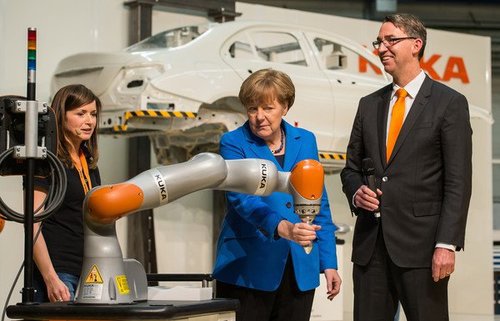
Germany Looks to Refugees for Labor, Even as It Transforms the Workplace with Automation
10/17/2015
One of the reasons given for German Chancellor Angela Merkel’s excessive welcome to Syrian refugees was to add humans to the nation’s workforce.
Tapping refugees to combat Germany’s labor shortage, Deutsche Welle, September 2, 2015The thousands of refugees pouring into Germany every day could offer Europe’s largest economy an opportune solution to plug the ‘gray gap’ in its aging workforce. But integrating the new arrivals could be costly.
But wait. Germany is rejiggering services and production via automation just as rapidly as America, so a lot fewer workers are needed in the near future and going forward. Merkel is quite aware of the technological transformation because she has seen it firsthand in a 2015 visit to the KUKA industrial robotics factory in Augsburg. (Above.)
Check out the German video below that promotes the idea of robots as “helpers” to workers — a ploy of business owners to disguise the inherent job loss of automation. Note the use of the word “colleagues” to describe the human-robot relationship.
The point is that Germany is getting automated, and fast. There’s no need to import hostile Muslims who will bring crime and jihad. Plenty of jobless Europeans, like Spaniards for example, are willing to move to Germany for employment.
Merkel is crazy to endanger Germany and all of Europe by admitting millions of Muslims, the historic enemy of the West.
NARRATOR: Workplace accidents like this simulated one are horror scenarios for companies that rely on robots, but soon transmitters embedded in work clothing will enable robots to recognize their human colleagues better. Scientists at the University of Bremen are working on sensor technology to help intelligent machine tools respond more flexibly to their surroundings.PIERRE KIRISCI: A tool may be passive but when I equip it with the appropriate technology, for example an RFID chip or a microprocessor, and make it capable of gathering the data from its surroundings and communicating with it and even processing it, then this can be considered an intelligent component.
NARRATOR: Such components are not only delivered to major companies but many medium-sized ones as well. The Quast Company, for example, produces high tech for the aviation industry. In the future it wants an intelligent component to manage the complicated production process.
DORIT KLEINERUSCHKAMP: It would be nice to have a self-learning tool that could configure itself — not for five years of course. If there are changes in the production chain, for example a supplier doesn’t deliver on time, it would immediately recognize that and tell us that there is a change in the process as a whole and possibly in the delivery or completion date.
NARRATOR: It could ultimately lead to the creation of an autonomous factory, The researchers in Bremen have built a small replica of a headlight factory. If there aren’t enough components at a station, the production management system reacts and reschedules orders. But every type of production still needs the help of human workers.
MARIUS VEIGT: The goal is not to eliminate humans from production. That was attempted a few years ago and it failed miserably. That’s not the concept we’re aiming for. We want to employ technologies that support people, to avoid waste and make processes more efficient.
NARRATOR: That’s possible thanks to digital technology, from sensors to microchips, to monitor the entire production process. It is still unusual, but think of other products. Thirty years ago, nobody imagined how common smart phones would become.
MARIUS VEIGT: A smartphone — no, it would be much too expensive for individuals. Now it’s widespread. The same will prove true in production. Items that are expensive now will become common in 10 years but it will take much more time before autonomous factories are up and running. Intelligent machinery is being introduced into the production process one step at a time.
